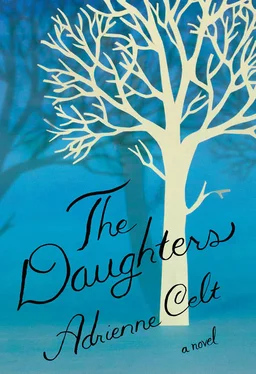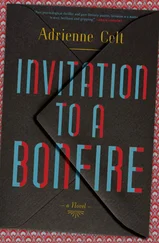But the thought of getting up brought dread, increasingly. Especially the thought of Zhenjin, his low bow at the door, his antiseptic eagerness to please. What are you doing , I asked myself. What do you want from him? Not his embrace, his mouth on mine. I just felt that he was holding something back from me — that beneath his crisp shell beat a heart I could not reach. And that was a problem. At home I could count on John to feed me his intimate secrets and stories. But here, I would get out of bed and things would spiral out of my control. Instinct would take over, pushing me to show my good side for photographs, smiling with teeth as sleek as sculpted ice.
Zhenjin had warmed my hands in the car, held them very gently. But he also walked away instead of being asked to go. What if, then, I walked onstage and found myself without the strength to sing? Wouldn’t it be better to stay here, where I needed nothing? To jump up just briefly and lock myself in with the duvet curled around my neck? I could remain in the bed until the fire squad — if such a thing existed in Ulaanbaatar — came and axed my door to smithereens, dragged me to the airport. I could walk into the hall and discover I’d been transported home, that John was in the kitchen cooking risotto.
A knock stirred me.
“Yes, hello?” It was Zhenjin’s voice, polite and inquiring. “Am I disturbing you?”
“One minute,” I called. Look at yourself . I ran a hand over my face. You’re just jet-lagged. Put on a sweater. Put on pants. Slowly I pieced my outer shell back together and recovered my gown from the closet, where it had been transported from the car by unseen hands, still zipped inside the whispering black garment bag. I inquired at the mirror — I was more or less composed — and threw open the door, nodding to Zhenjin.
“Good,” I said. “You can keep me honest.” I tossed the garment bag over his shoulder and buttoned my coat. “Let’s walk to the opera house.”
“We have a car.”
“No, I need the walk.” I tugged on my mittens. “It’ll bring me back.” I paused. “I mean, wake me up.” Zhenjin looked at me, stern, and I thought, No, your job is to give me what I want . I took his hand and pulled him down the hall, feeling the soft catch as his shoulder extended. Zhenjin made no move to resist, or hold tighter.
The festival organizers had planned well enough to book rooms in a hotel mere blocks from the National Academic Theatre of Opera and Ballet, a pink Romanesque building studded with white colonnades. The Opera House, as they called it, was another surprise: an Easter egg shell filled with a Samarkand mosque. The doorways were embellished with gold filigree and the lobby was filled with arches and domes. Inside, I released Zhenjin and sent him, blushing slightly while he opened and closed his hand, to deliver my gown to the dressing room.
Singers are not ballet dancers. We breathe into our bellies. Expand the diaphragm and keep it expanded. Do not be afraid of a little pot belly, because it indicates power. This type of breathing also affords you the feeling of appetite.
I walked through the Opera House hallways and ran the pad of my index finger over a crashing, cascading loop of gold painted onto the wall. It appeared to be flecking off, so high was the glisten, and I rubbed my finger against my thumb, looked at both, surprised for an instant to find no golden powder there. Butterfly wings. John sometimes catches moths off the dandelions that grow up through the cracks in the sidewalk, presenting them to me as a magic trick— ta-da. His hands are always dusted, after. But John wasn’t there, and in his place was a hollow orb I had to fill myself. I breathed in the gold, imagined myself licking the entire hallway clean, gobbling down the sugar cube façade of the Opera House in hungry gulps. To eat something is to absorb its power. Many cultures have thought so. I strolled around taking in everything I could see and everything I couldn’t, all the music that had ever shown there: inhale Handel, exhale Liszt.
The stage itself was familiar, as stages tend to be worldwide, the ceiling hung with acoustical beams and curves, the flat dark wood of the stage floor swept clean. I took in the scent of dust and polish. The wire tang of the piano.
I fished my phone out of my purse, warming the near-frozen electronics against my chest, and turned on the metronome application so it ticked and tocked like a clockwork heartbeat. To sing, your breath must be steady and controlled. You must always be shoring away air for later use, never expending yourself to the last gasp. This keeps your voice from becoming vulnerable. You have something on hand: a socket of oxygen, the smile of a near-stranger who warms your fingers and has thin eyes and skin like wrinkled paper.
That night I stood before an audience of colleagues in tailcoats and gowns, plus locals who bought tickets whether they were interested or not, to encourage the Ulaanbaatar city council to organize more international festivals. All day I had been keyed up by fear or exhaustion or desire for something that I couldn’t name. But now everything that had filled me rushed out. Rinsed off. As simple as that. I sang the dirty gasoline smell of the snow, and the holes in the road that Zhenjin swerved casually to avoid. I sang the cold that leeched up through my shoe soles like water and froze the balls of my feet, the tips of my toes. I sang the broken outer windows of hotel towers and the gold light of the lamps within, the silver brads on the uniforms of the bellhops who lined up in the lobby on the way to my room. I sang the gruff mumbling of the bear I imagined was furnishing me with his skin, and the snowy backsides of yaks I was told were kept on farms on the city outskirts. I was relieved, so relieved to sing. I sang Snegúrochka the snow maiden. I sang her fifteen years of winter, and then I sang her melting into spring.
I look back now on that period of my life with terrible jealousy. So recent, and yet so distant. Three years ago I was in Mongolia, and my body was still the body I’d been born with, tightly packed. Tightly wound.
Because sound is so rich with texture, it is endangered by travel through time as much as it is by travel through space. Look at me: once all I wanted was to have enough energy for my own life, enough control of my lungs to make each note clear. Now my body has changed allegiances. Now my heart has. There is Kara to contend with, and instead of wanting to take something from her, I’m afraid of all I want to give.
Taking me to the opera was my mother’s last attempt to make me her own. Like everything she does, she went about it in a strange way: not many parents would choose to bring their daughters to witness a tragedy to which they are namesake. But whatever her insufficiencies, my mother understood my sense of pride. She knew that seeing the name Lulu on the tickets would thrill me more than the character’s death would undo me.
The show was a matinee on one of those magical Chicago days that are clear and bright, so the cold doesn’t seem so punishing. Walking outside reddened our noses, and my mother pinched mine with her gloved fingers — I could feel the faint pressure from her long manicured nails beneath the leather.
“Let’s pretend we’re orphans,” Sara said to me. “Only not really orphans. Children abandoned at birth who discover that they’re really royalty.”
“And magic?”
“Yes.” She smiled. “And magic. This will be our first time out in the world in our new clothes, and no one will recognize us. They’ll all be impressed with how pretty and fancy we are, and even people”—her face darkened—“who’ve been terrible to us and shunned us because of our orphanhood will love us and sing our praises. And we’ll be kind to them.” The darkness lifted from her like a cloud in the wind.
Читать дальше












